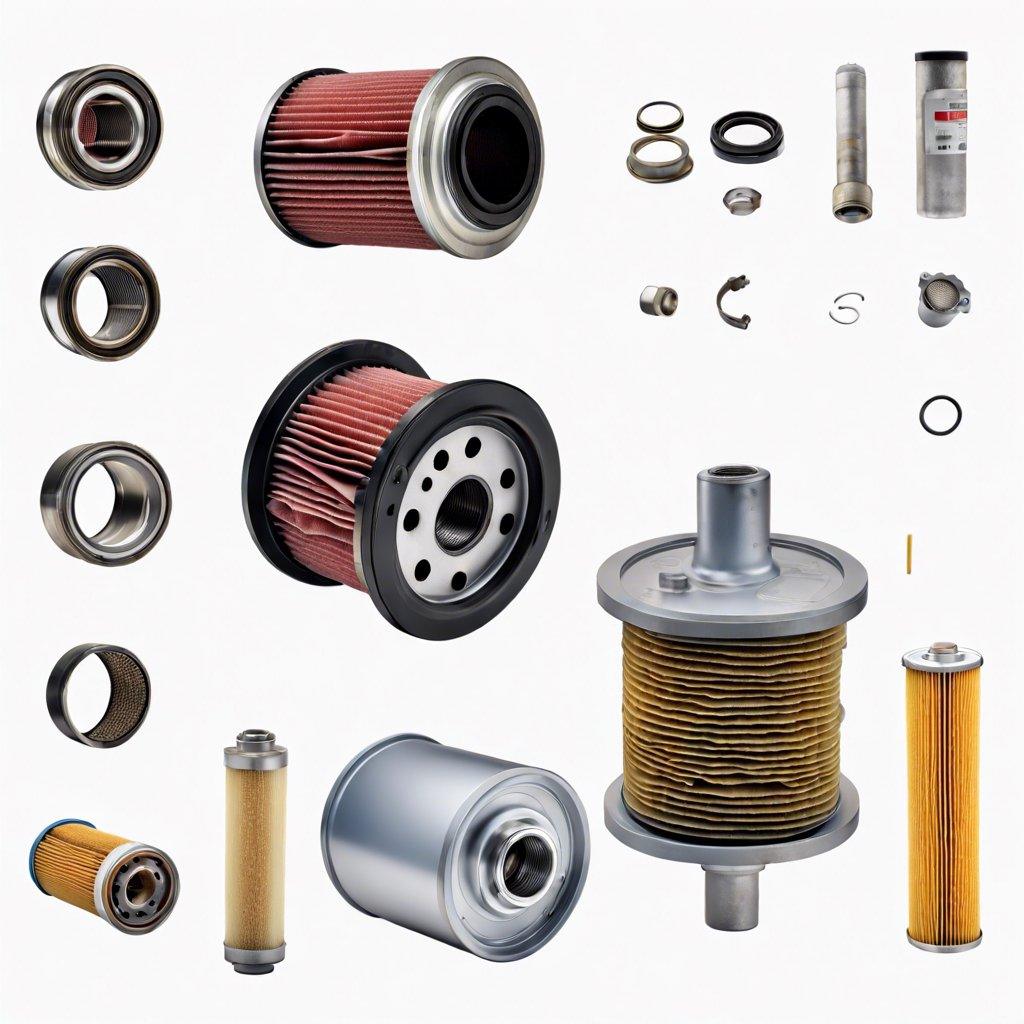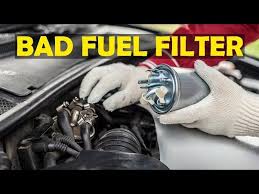Recognizing the Early Signs of Fuel Filter Failure
Identifying Fuel Filter Deterioration Indicators

As an engineering or technology employee, it is crucial to be able to recognize the early signs of fuel filter failure. This knowledge can help prevent costly breakdowns and ensure the efficient operation of machinery or equipment. Here are some key indicators that can help identify fuel filter deterioration:
Reduced Fuel Flow
One of the most obvious signs of a failing fuel filter is a noticeable reduction in fuel flow. This can manifest as decreased engine performance, decreased fuel efficiency, or difficulty starting the engine.
Increased Fuel Pressure
As the fuel filter becomes clogged, the fuel pressure in the system will increase. This can be detected by monitoring the fuel pressure gauge or by experiencing a sudden surge in fuel pressure when the engine is running.
Visible Contaminants
Regularly inspecting the fuel filter can reveal the presence of contaminants, such as dirt, rust, or debris. The presence of these materials indicates that the filter is no longer effectively removing impurities from the fuel.
Reduced Engine Performance
As the fuel filter becomes increasingly clogged, the engine may experience a noticeable decrease in performance, such as reduced power, acceleration, or overall responsiveness.
Increased Fuel Consumption
A clogged fuel filter can cause the engine to work harder, resulting in increased fuel consumption. This can be a significant indicator of filter deterioration, especially if the increase in fuel usage is not accompanied by changes in driving conditions or load.
Frequent Filter Replacements
If the fuel filter requires replacement more often than the manufacturer’s recommended interval, it may be a sign of an underlying issue, such as a problem with the fuel system or the presence of contaminants in the fuel.
By being vigilant and monitoring these indicators, engineering and technology employees can proactively identify fuel filter deterioration and take necessary action to maintain the optimal performance and efficiency of their machinery or equipment.
Proactive Monitoring: Preventing Premature Fuel Filter Failure
In the world of engineering and technology, where efficiency and reliability are paramount, recognizing and addressing the early signs of fuel filter failure is crucial. Fuel filters play a vital role in maintaining the health and performance of engines, protecting them from contaminants and ensuring smooth operation. Proactive monitoring and timely intervention can help prevent premature fuel filter failure, optimizing system performance and minimizing costly downtime.
Understanding the Fuel Filter’s Role
The fuel filter’s primary function is to remove impurities, such as dirt, rust, and other particulates, from the fuel before it reaches the engine. Over time, these contaminants can accumulate within the filter, reducing its effectiveness and leading to a variety of issues, including decreased fuel flow, increased fuel system pressure, and even engine damage.
Early Warning Signs of Fuel Filter Failure
Recognizing the early signs of fuel filter failure is essential for proactive maintenance and prevention. Some common indicators include:
- Reduced Fuel Efficiency: If your vehicle or equipment is experiencing a noticeable drop in fuel efficiency, it may be a sign that the fuel filter is becoming clogged and restricting fuel flow.
- Decreased Engine Power: As the fuel filter becomes more restrictive, the engine may struggle to maintain its usual power output, leading to sluggish performance or even stalling.
- Difficulty Starting: A clogged fuel filter can impede the engine’s ability to start, resulting in delayed or failed ignition.
- Increased Fuel System Pressure: Monitoring the fuel system pressure can provide valuable insights into the condition of the fuel filter. A significant increase in pressure may indicate a blockage that requires attention.
Proactive Maintenance Strategies
To prevent premature fuel filter failure, it is essential to implement proactive maintenance strategies. This includes regularly inspecting and replacing the fuel filter according to the manufacturer’s recommendations, as well as monitoring the fuel system for any signs of potential issues. By staying vigilant and addressing problems early, you can ensure the longevity of your fuel system and minimize the risk of costly breakdowns.
| Maintenance Interval | Recommended Action |
|---|---|
| Every 10,000 miles (or as specified by the manufacturer) | Inspect and replace the fuel filter if necessary |
| Whenever fuel system issues are suspected | Perform a comprehensive fuel system inspection and address any identified problems |
By proactively monitoring the fuel filter and implementing a robust maintenance program, engineering and technology professionals can ensure the optimal performance and longevity of their equipment, minimizing downtime and maximizing productivity.
The Crucial Role of Fuel Filters: Recognizing Potential Breakdowns
Understanding the Importance of Fuel Filters
Fuel filters play a crucial role in the proper functioning of an engine. They are designed to remove contaminants, such as dirt, rust, and other impurities, from the fuel before it reaches the engine’s vital components. Maintaining the health of fuel filters is essential to ensure optimal engine performance, fuel efficiency, and longevity.
Identifying the Early Signs of Fuel Filter Failure
Recognizing the early signs of fuel filter failure is crucial to prevent more severe issues and costly repairs. Here are some common indicators that a fuel filter may be failing:
- Decreased Fuel Pressure: A clogged or restricted fuel filter can result in decreased fuel pressure, leading to reduced engine power and performance.
- Rough Idling or Stalling: A malfunctioning fuel filter can cause irregular fuel delivery, leading to rough idling or even engine stalling.
- Decreased Fuel Efficiency: As a fuel filter becomes clogged, the engine has to work harder to draw fuel, resulting in decreased fuel efficiency.
- Difficulty Starting the Engine: A blocked fuel filter can make it challenging to start the engine, especially when the engine is cold.
Preventive Maintenance and Replacement
To prevent fuel filter failures and ensure optimal engine performance, it is recommended to follow the manufacturer’s recommended maintenance schedule for replacement. Regular fuel filter inspections and timely replacements can help:
- Maintain consistent fuel flow and pressure
- Protect the engine from contaminants
- Improve fuel efficiency
- Extend the engine’s lifespan
Fuel Filter Replacement Considerations
When replacing a fuel filter, it is essential to use the correct filter type and size recommended by the vehicle manufacturer. Improper filter selection can lead to further issues, such as:
- Restricted fuel flow
- Increased pressure drop
- Premature filter clogging
| Fuel Filter Replacement Interval | Typical Mileage Range |
|---|---|
| Light-Duty Vehicles | 30,000 to 50,000 miles |
| Heavy-Duty Vehicles | 10,000 to 15,000 miles |
Adhering to the recommended fuel filter replacement intervals is essential to maintain the overall health and performance of the engine.
Safeguarding Vehicle Performance: Timely Fuel Filter Replacement
Importance of Fuel Filter Maintenance
The fuel filter plays a crucial role in maintaining the overall performance and longevity of a vehicle’s engine. As the primary barrier against contaminants, a well-functioning fuel filter ensures that clean, uncontaminated fuel reaches the engine, preventing costly repairs and optimizing fuel efficiency.
Recognizing the early signs of fuel filter failure is essential for proactive maintenance and preventing more significant issues. Some common indicators include:
- Reduced Fuel Efficiency: A clogged or partially blocked fuel filter can restrict fuel flow, leading to decreased engine performance and reduced fuel economy.
- Difficulty Starting the Engine: A failing fuel filter may impede the engine’s ability to start, especially in cold weather conditions.
- Hesitation or Stalling: Intermittent hesitation or stalling during acceleration can be a sign of fuel filter-related problems.
- Increased Engine Noise: As the fuel filter becomes more restrictive, the engine may exhibit a louder, more labored operation.
Timely Fuel Filter Replacement
Proactive fuel filter replacement is essential for maintaining optimal vehicle performance and preventing more severe issues. Manufacturers typically recommend replacing the fuel filter at specific mileage intervals or based on the vehicle’s service schedule. Adhering to these guidelines can ensure the consistent delivery of clean fuel to the engine, extending its lifespan and improving overall driving experience.
| Replacement Interval | Typical Mileage |
|---|---|
| Gasoline Vehicles | 30,000 – 50,000 miles |
| Diesel Vehicles | 10,000 – 15,000 miles |
By recognizing the early signs of fuel filter failure and adhering to recommended replacement intervals, engineering and technology professionals can help ensure the optimal performance and longevity of their vehicles, ultimately contributing to improved operational efficiency and cost savings.




Post Comment